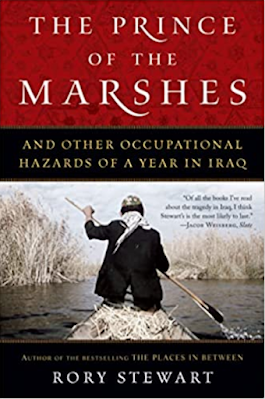Stewart, Rory, The Prince of the Marshes, And Other Occupational Hazards Of A Year In Iraq, Orlando, Austin, New York, San Diego, Toronto, London: Harcourt Inc, 2006
Rory Stewart was a British Coalition Provisional Authority (CPA) official in Maysan and Dhi Qar provinces in southern Iraq. He was tasked with setting up local governments and starting construction projects. His book The Prince of the Marshes, And Other Occupation Hazards Of A Year In Iraq documents all the problems he faced trying to achieve those two goals. That included a CPA administration in Baghdad that didn’t care about the governorates, dozens of competing parties, sheikhs and tribes, and an uprising by the followers of Moqtada al-Sadr. His firsthand experience goes with others from this period who believed America made a hollow promise that it came to Iraq to create a democracy and rebuild the country.
Stewart walked into chaos as soon as he arrived in Iraq. In Maysan province he found services were down, schools were looted and there were food shortages. His first priority was to try to resolve those issues but he struggled with the Coalition bureaucracy to get money released from Baghdad. Eventually he did and started dozens of projects but there were always demands for more by the Iraqis while others accused the CPA of doing nothing. In general, the CPA ignored the provinces as shown by the fact that it only gave each a skeleton staff of a dozen or so people and didn’t deliver the resources they needed. The author was one of a few officials in Maysan who were constantly overtaxed by the demands made upon them.
Next there were dozens of tribes, sheikhs and Islamist parties all vying for power. The biggest were Abu Hatim who was a guerrilla leader known as the Prince of the Marshes, the Supreme Islamic Council for the Revolution in Iraq and its Badr militia who arrived from Iran and were funded by that country, and the Sadrist movement who were all opposed to each other. Trying to create a provincial council and pick a police chief and governor out of this mix was no easy task. Stewart and his staff eventually got each appointed but they constantly fell into conflict as the different factions demanded more power. Parties would form demonstrations and march to the CPA office demanding that they get one position or another. That also brought violence as the main factions were well armed. This called for constant negotiations and bargaining which Stewart documented again and again.
Things were even worse in Dhi Qar. When Stewart arrived there little to nothing had been accomplished. The CPA office didn’t even know the major tribes and parties. Then the Sadrists rose up and the Italian military who were supposed to provide security largely refused to do anything. At the same time, CPA central in Baghdad constantly played down the threat that Stewart and others were facing. If not for a small group of security guards the Dhi Qar office would have been overrun and the staff would have been killed or captured. These action sequences the author described are the most exciting parts of the book. His office really was on the brink for several days.
Stewart’s main thoughts were that the Coalition should have restored public services and provided security and then moved onto bigger issues like forming a government. Instead, the CPA tried to do everything at once and neglected it all. At the local level where the author worked the CPA supported minorities, women and NGOs which had little chance to continue once the Coalition withdrew. Instead power in southern Iraq mostly went to the Islamic parties with militias. Other CPA officials who served in the provinces had similar experiences and thoughts. Their general opinion was that the Americans and the British made too many promises in Iraq which they could never fulfill because they didn’t plan for the occupation and didn’t adequately fund it either. Stewart adds his story to theirs about just how dysfunctional the Coalition Provisional Authority was and how it failed to achieve its grand schemes in Iraq.
Link to all of Musings On Iraq’s book reviews listed by topic





No comments:
Post a Comment